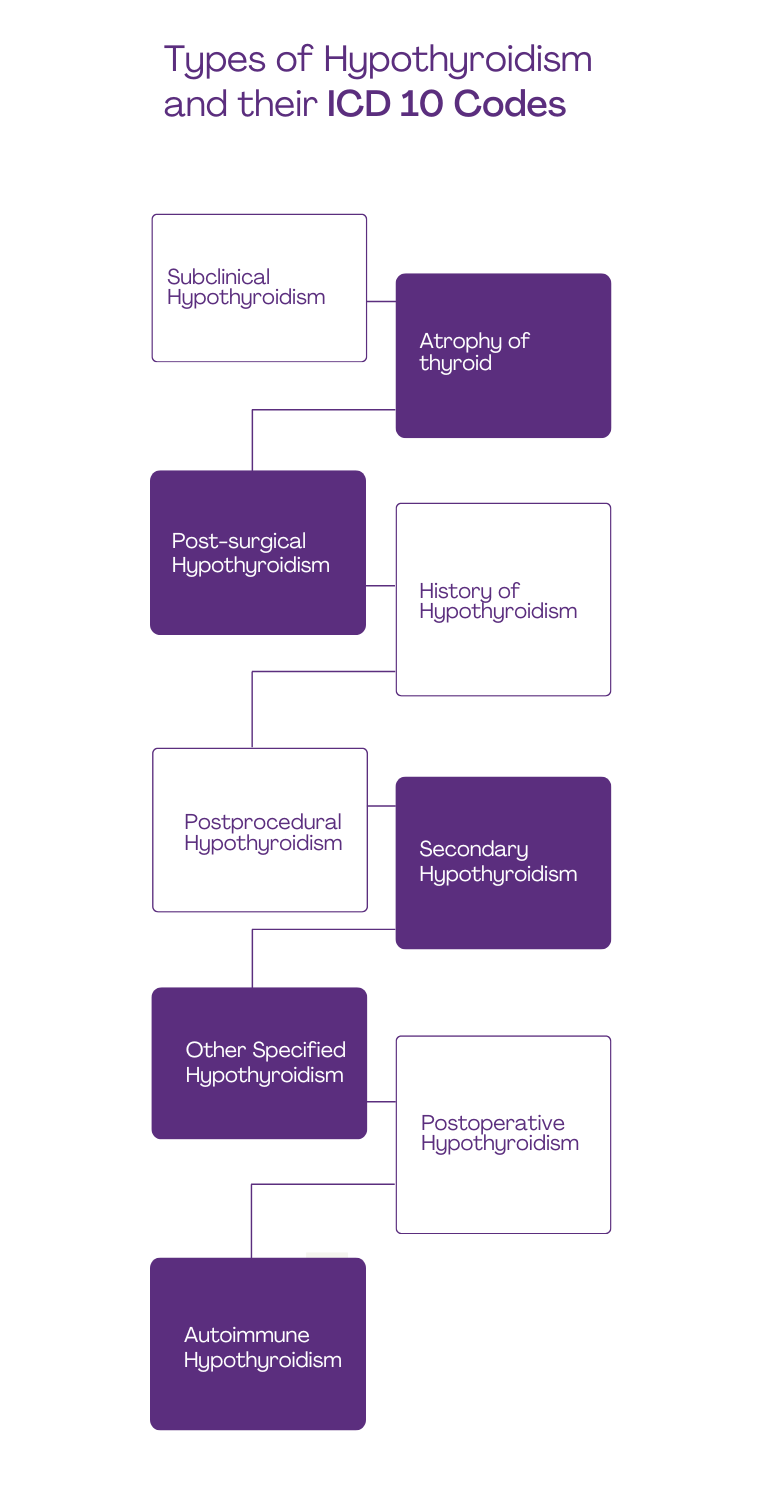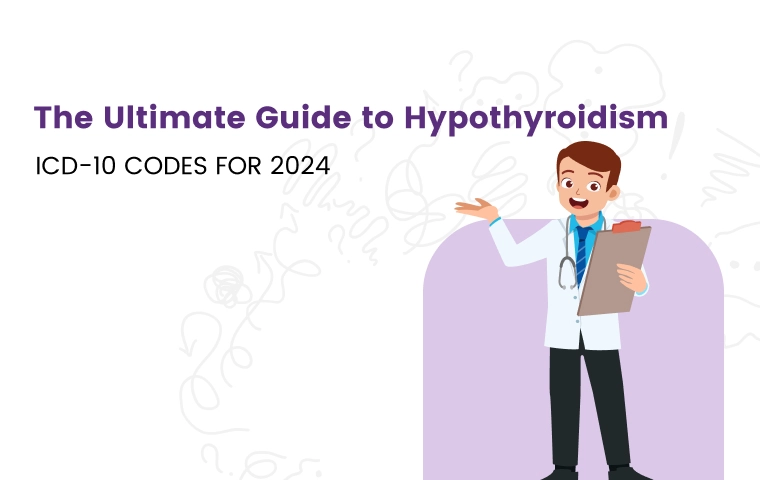Dealing with hypothyroidism in medical billing? It can be tricky. Hypothyroidism comes in many types, and it's easy to get confused about which hypothyroidism ICD-10 code to use. This is important because getting the code right is key to getting your claims accepted.
To make things easier, we've put together a guide on hypothyroidism ICD-10 codes. It's got everything you need to know for coding any hypothyroidism case. Let's get started and make sure you're using the right codes every time.
What is Hypothyroidism?
Hypothyroidism is a common condition where the thyroid gland doesn't produce enough thyroid hormone. This small gland in your neck plays a huge role in your body's metabolism, heart rate, and more. When it's underactive, it can lead to a variety of symptoms and health issues.
Symptoms of hypothyroidism can be quite broad and may include fatigue, weight gain, cold intolerance, slow heart rate, depression, and dry skin. It's a condition that can affect anyone, but it's more common in women and older adults.
There are several causes of hypothyroidism. The most common one is Hashimoto's thyroiditis, an autoimmune disorder. Other causes include certain medications, thyroid surgery, and radiation therapy. Sometimes, the cause remains unknown.
Understanding hypothyroidism is crucial for healthcare providers and medical billers. It's not just about knowing the medical side of things; it's about understanding how this condition translates into coding for billing and insurance purposes.
Each type and cause of hypothyroidism might have a different ICD-10 code, so it's important to be precise to ensure accurate billing and optimal patient care.
Billable ICD 10 Code For Hypothyroidism
For hypothyroidism, the primary billable ICD-10 code is E03.9, which represents "Hypothyroidism, unspecified." This code is used when the patient's hypothyroidism is not specified or when there is insufficient information to choose a more specific code. It's a general code that covers the basic diagnosis of hypothyroidism.
It's important to note that while E03.9 is a billable code, it's often more beneficial to use a more specific code when possible. Specificity in coding not only helps in accurate disease classification but also assists in streamlining the insurance claim process. Detailed documentation and a thorough understanding of the patient's condition can lead to the selection of a more precise code, which in turn can improve the efficiency of billing and reimbursement processes.
Types of Hypothyroidism and their ICD 10 Codes
Hypothyroidism can present in various forms, each with its unique characteristics and specific ICD-10 codes. Understanding these types is crucial for accurate coding and billing. Here's a breakdown of the different types of hypothyroidism and their corresponding ICD-10 codes:

Subclinical Hypothyroidism:
It's a form of hypothyroidism, which means that the thyroid gland doesn't produce enough thyroid hormones to meet the body's needs.
Iodine is an essential trace element that the thyroid gland uses to produce thyroid hormones, primarily thyroxine (T4) and triiodothyronine (T3). These hormones play a crucial role in regulating various bodily functions, including metabolism, energy production, and maintaining the health of organs and tissues. The subclinical hypothyroidism ICD 10 code is E02.
Atrophy of thyroid:
Thyroid atrophy refers to a condition in which the thyroid gland becomes smaller or shrinks in size. This can occur due to various underlying causes, and it is often associated with a reduction in thyroid function. It is also quoted as acquired hypothyroidism, and E03.4 is used as acquired hypothyroidism icd 10.
Post-surgical Hypothyroidism:
Post-surgical hypothyroidism, also known as post-thyroidectomy hypothyroidism, is a condition that occurs after the surgical removal of part or all of the thyroid gland. E89.0 is coded as Postprocedural hypothyroidism icd 10.
History of Hypothyroidism:
When documenting a patient's medical history that includes hypothyroidism, use Z83.3 (Family history of other endocrine, nutritional and metabolic diseases).
Postprocedural Hypothyroidism:
This is coded as E89.0 and is similar to post-surgical hypothyroidism.
Secondary Hypothyroidism:
Secondary hypothyroidism is a type of hypothyroidism that occurs when there is a problem with the pituitary gland or hypothalamus in the brain, leading to inadequate stimulation of the thyroid gland. the code is E23.0 (Hypopituitarism).
Other Specified Hypothyroidism:
For cases that don't neatly fit into the above categories but are specified, use E03.8.
Postoperative Hypothyroidism:
Similar to post-surgical and postprocedural hypothyroidism, it's coded as E89.0.
Autoimmune Hypothyroidism:
Autoimmune hypothyroidism, also known as Hashimoto's thyroiditis, is a common autoimmune disorder that affects the thyroid gland. In this condition, the body's immune system mistakenly attacks and damages the thyroid tissue, leading to inflammation and impaired thyroid function. The autoimmune hypothyroidism icd 10 code is E06.3.
Coding Guidelines for Hypothyroidism
The specificity of the ICD-10 codes allows healthcare providers to document the severity and type of hypothyroidism accurately. This is crucial not only for treatment planning but also for billing and insurance purposes. For example, differentiating between congenital, acquired, or drug-induced hypothyroidism is essential, as each type requires a distinct ICD-10 code. Additionally, coding for comorbidities is important for comprehensive patient care and billing accuracy.
The transition from ICD-9 to ICD-10 has enhanced the specificity and global standardization in health statistics, reflecting the evolving needs of healthcare documentation. Keeping up-to-date with the latest coding updates and revisions is vital for healthcare providers to ensure accuracy in diagnosis, treatment, and administrative processes.
Final Words
As we wrap up our guide on hypothyroidism and the complexities of its ICD-10 coding, it's clear that precision and specificity are paramount in medical billing. Understanding the nuances of hypothyroidism, from its common symptoms to its various types, empowers healthcare providers and medical billers to navigate the intricate landscape of ICD-10 codes with confidence.
If you want to know more or are having issues related to your medical billing or want to outsource medical billing services, get in touch with the HMS USA LLC known as the best medical billing company in NY!
ABOUT AUTHOR

Chris Jehrico
As a blog writer with years of experience in the healthcare industry, I have got what it takes to write well researched content that adds value for the audience. I am a curious individual by nature, driven by passion and I translate that into my writings. I aspire to be among the leading content writers in the world.
